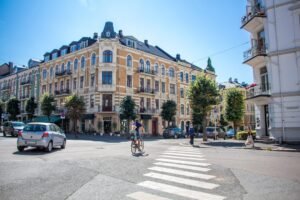

How to Talk About Culture and Traditions in Norwegian
Have you ever experienced the profound connection that comes when you truly understand and appreciate someone’s culture? It’s as if a door opens, revealing a world filled with rich traditions, customs, and stories. That’s the power of language – it allows us to bridge the gap between cultures and build meaningful connections. If you’re fascinated by Norwegian culture and traditions, and want to delve deeper into this captivating world, you’ve come to the right place.
In this article, we will journey together to learn how to talk about culture and traditions in Norwegian. We will uncover the nuances of the Norwegian language, explore key vocabulary, grammar, and pronunciation, and empower you to engage in conversations that celebrate the traditions of Norway. To kickstart your language learning journey, we’ll also introduce you to the NLS Norwegian Language School in Oslo, a renowned institution that can guide you every step of the way on this exciting path.
Table of Contents
ToggleThe Significance of Learning Norwegian
Learning the Norwegian language opens up a world of opportunities. Whether you are interested in traveling to Norway, communicating with Norwegian friends or family members, or advancing your career prospects, taking online Norwegian courses or attending language classes can help you achieve your goals.
“Learning a new language is like opening a door to a whole new culture.”
When you learn Norwegian, you gain the ability to connect with Norway’s rich cultural heritage and engage in meaningful conversations with native speakers. Studying the language allows you to delve deeper into Norwegian traditions, literature, and art, gaining a unique perspective on the country’s history and customs.
By enrolling in online Norwegian courses or attending physical Norwegian language classes, you can immerse yourself in the language and develop the necessary skills to communicate effectively in Norwegian. Whether you prefer self-paced online learning or interactive classroom environments, these courses provide a structured curriculum designed to facilitate your language acquisition journey.
NLS Norwegian Language School in Oslo
One reputable institution that offers online Norwegian courses and language classes is NLS Norwegian Language School. Based in Oslo, NLS provides comprehensive language training to students of all levels, from beginners to advanced learners.
At NLS, experienced instructors utilize modern teaching methods and materials to ensure that students not only learn the language but also gain a deeper understanding of Norwegian culture and society. The school’s goal is to foster a supportive and engaging learning environment where students can thrive and achieve their language learning objectives.
When you choose NLS for your Norwegian language education, you benefit from:
| Benefits | Why Choose NLS? |
|---|---|
| Flexible Learning Options | NLS offers both online courses and in-person classes, providing flexibility to accommodate different schedules and learning preferences. |
| Experienced Instructors | The school employs highly qualified instructors who are native Norwegian speakers with expertise in teaching Norwegian as a second language. |
| Comprehensive Curriculum | The curriculum at NLS is carefully designed to cover all aspects of language learning, including vocabulary, grammar, reading, speaking, and listening. |
| Small Class Sizes | With small class sizes, every student receives personalized attention and ample opportunities for interaction and practice. |
| Engaging Learning Materials | NLS provides a range of modern and interactive learning materials, including textbooks, online resources, and multimedia tools. |
By choosing NLS Norwegian Language School, you can embark on your language learning journey with confidence, knowing that you are receiving high-quality instruction and support from a reputable institution.
Navigating the Norwegian Language
To effectively talk about culture and traditions in Norwegian, it is essential to have a strong foundation in the language. Whether you are just starting out or looking to brush up on your skills, understanding Norwegian vocabulary, grammar, beginner lessons, and pronunciation is key to expressing yourself with confidence. Let’s dive into each of these aspects in detail to help you navigate the Norwegian language.
Norwegian Vocabulary
Vocabulary forms the building blocks of any language, and Norwegian is no different. Learning common Norwegian words and phrases will enable you to discuss culture and traditions more effectively. Start by focusing on everyday words and phrases related to culture, such as greetings, expressions, foods, and activities. Expand your vocabulary by practicing themed word lists and engaging in conversations with native speakers. Here’s an example of some essential Norwegian vocabulary to get you started:
| Norwegian Word | English Translation |
|---|---|
| Velkommen | Welcome |
| Tradisjoner | Traditions |
| Mat | Food |
| Festivaler | Festivals |
| Helligdager | Holidays |
| Familie | Family |
| Kultur | Culture |
| Nasjonaldrakt | National costume |
| Musikk | Music |
| Kunst | Art |
Norwegian Grammar
Grammar provides the structure and rules for constructing meaningful sentences. While Norwegian grammar shares similarities with other Germanic languages, it also has unique features. Understanding Norwegian grammar will help you form sentences correctly and convey your thoughts accurately. Start by learning basic grammar concepts such as noun gender, verb conjugation, word order, and sentence structure. Practice using grammar exercises and seek guidance from language tutors to gain confidence in your grammatical skills.
Beginner Norwegian Lessons
As a beginner, it’s important to start with structured language lessons that introduce you to the fundamentals of Norwegian. Beginner Norwegian lessons cover essential topics such as introductions, greetings, numbers, time, and basic sentence construction. These lessons often incorporate vocabulary acquisition, grammar explanations, and interactive exercises to reinforce your learning. Online language platforms and language schools like NLS Norwegian Language School in Oslo offer beginner courses designed to support your language journey.
Norwegian Pronunciation
Mastering Norwegian pronunciation is crucial for effective communication. While Norwegian pronunciation may seem challenging at first, with practice and guidance, you can develop a natural-sounding accent. Pay attention to vowel sounds, consonant combinations, and stress patterns in Norwegian words. Listen to native speakers, utilize online pronunciation resources, and practice speaking aloud to refine your pronunciation skills.
By focusing on vocabulary, grammar, beginner lessons, and pronunciation, you will build a strong foundation in the Norwegian language and gain the confidence to discuss culture and traditions fluently. Remember to practice regularly, engage with native speakers, and seek additional support from language learning resources like NLS Norwegian Language School in Oslo. Happy learning!
Understanding Norwegian Culture and Traditions
When learning Norwegian, it’s not just about mastering the language. It’s also about immersing yourself in the rich culture and traditions of Norway. Having a deep understanding of Norwegian culture will not only enhance your language learning experience but also enable you to connect with native speakers on a more meaningful level. In this section, we will explore important aspects of Norwegian culture, including food, festivals, and customs, providing you with valuable insights to engage in conversations with confidence.
Traditional Norwegian Cuisine
Norwegian cuisine is a delightful fusion of simplicity, freshness, and unique flavors. From hearty fish dishes to mouthwatering pastries, Norwegian food reflects the country’s coastal landscape and rich agricultural heritage. Some popular traditional dishes to explore include:
| Dish | Description |
|---|---|
| Fårikål | A comforting lamb and cabbage stew, often enjoyed during the autumn months. |
| Lutefisk | A preserved cod dish that is traditionally eaten during the Christmas season. |
| Krumkake | A delicate and crisp wafer cookie, typically filled with whipped cream or jam. |
By learning Norwegian, you’ll not only be able to savor these delectable dishes but also engage in conversations about traditional Norwegian cuisine with locals.
Festivals and Celebrations in Norway
Norwegians love to celebrate their culture and heritage through various festivals and traditions throughout the year. Whether it’s the lively May 17th Constitution Day or the enchanting Winter Solstice celebrations, there is always something exciting happening. Here are a few notable festivals and celebrations in Norway:
“The Norwegian Midnight Sun Marathon is a highlight of the summer season. Running through the stunning Arctic landscape, this event brings together locals and international participants in a celebration of endurance and natural beauty.”
By delving into the culture and learning Norwegian, you’ll gain an appreciation for the significance of these festivals and be able to actively participate and engage with locals during these joyful occasions.
Customs and Etiquette in Norway
Understanding the customs and etiquette of a country is crucial for building positive relationships and avoiding cultural misunderstandings. In Norway, punctuality, personal space, and respect for nature are highly valued. Here are some key customs and etiquette practices in Norway:
- Arrive on time for social engagements, as punctuality is respected.
- Respect personal space and avoid intrusive gestures or excessive physical contact.
- Practice good wilderness ethics and respect Norway’s stunning natural surroundings.
By incorporating these customs and etiquette practices into your interactions, you’ll demonstrate cultural sensitivity and leave a positive impression on Norwegians you meet along your journey.
With a deeper understanding of Norwegian culture, traditions, and language, you’ll be able to connect with locals in Norway in a more authentic and meaningful way. Consider enrolling in online Norwegian courses or attending language classes at NLS Norwegian Language School in Oslo to accelerate your learning journey and embrace the beauty of Norwegian culture.
Traditional Norwegian Cuisine
Norwegian cuisine is a true delight for food enthusiasts. Rooted in tradition and abundant in flavors, it offers a unique culinary experience. In this section, we will explore some of the most renowned traditional Norwegian dishes and introduce key vocabulary that will enhance your ability to discuss food and culinary traditions in Norwegian.
Sample Dishes and Specialties
| Dish | Description |
|---|---|
| Fårikål | A hearty stew made with tender lamb, cabbage, and potatoes, often enjoyed during the colder months. |
| Lutefisk | A preserved fish dish that is prepared by soaking dried fish in lye, giving it a unique texture and flavor. |
| Rakfisk | Fermented fish commonly served as an appetizer, featuring a distinct tangy taste that pairs well with traditional accompaniments like flatbread and sour cream. |
| Krumkake | A delicately thin, cone-shaped cookie often filled with whipped cream or sweet preserves, enjoyed during festive occasions. |
| Rømmegrøt | A creamy porridge made with sour cream, flour, and butter, typically served with melted butter, cinnamon, and sugar. |
These dishes are just a taste of the gastronomic wonders that Norwegian cuisine has to offer. Exploring these traditional delicacies will not only expand your culinary knowledge but also provide interesting talking points when engaging in conversations about food and Norwegian culture.
Sampling Norwegian cuisine allows you to savor the rich traditions and flavors that make it truly unique.
Vocabulary for Discussing Norwegian Food
To facilitate your conversations about Norwegian cuisine, here are some essential vocabulary words:
| English | Norwegian |
|---|---|
| Meat | Kjøtt |
| Fish | Fisk |
| Dairy | Meieriprodukter |
| Potato | Potet |
| Bread | Brød |
| Sweet | Søtt |
| Sour | Sur |
| Bitter | Bittert |
By incorporating these food-related terms into your vocabulary, you will be better equipped to discuss Norwegian cuisine and engage in conversations about food with native Norwegian speakers.
As you continue your language learning journey, remember that learning about traditional Norwegian cuisine not only expands your vocabulary but also provides valuable insights into the country’s rich cultural heritage.
Festivals and Celebrations in Norway
Norway is a country known for its vibrant festivals and rich cultural celebrations. Throughout the year, Norwegians come together to commemorate various events and traditions. By participating in these festivals, you not only get to experience the lively atmosphere but also deepen your understanding of Norwegian culture and traditions. Learning Norwegian will enable you to fully immerse yourself in these celebrations and engage with the local community.
Midsummer Celebration – Sankthansaften
One of the most popular summer festivals in Norway is the Midsummer Celebration, also known as Sankthansaften. The festival takes place on the eve of June 24th, marking the birth of St. John the Baptist. Norwegians gather around bonfires, sing traditional songs, and enjoy delicious food and drinks. Joining in the festivities provides a fantastic opportunity to practice your Norwegian language skills while embracing the enchanting atmosphere.
Constitution Day – 17th of May
Constitution Day, celebrated on May 17th, is Norway’s National Day. This joyous occasion commemorates the signing of the Constitution in 1814. Norwegians take to the streets, adorned in traditional attire, waving flags, and parading through the towns and cities. The air is filled with laughter, music, and Norwegian pride. Engaging in conversations with locals during this festive day will allow you to witness their fondness for their heritage, as well as practice speaking Norwegian in a lively context.
Christmas – Jul
Christmas, known as Jul in Norwegian, is a cherished time of year, steeped in traditions and customs. Norwegians celebrate the holiday season by decorating their homes with candles, ornaments, and lights. The aroma of traditional Christmas dishes, such as lutefisk and ribbe, fills the air. Carolers go from house to house, singing beautiful Norwegian Christmas songs. By learning Norwegian, you can fully immerse yourself in the warmth and coziness of Norwegian Christmas and communicate your holiday wishes with locals.
Music Festivals
Norway is also renowned for its music festivals, which attract visitors from all over the world. One of the most famous music festivals is the Øya Festival in Oslo, featuring both international and Norwegian artists. Other notable music festivals include Bergenfest in Bergen and the Midnight Sun Marathon Concert in Tromsø. Attending these festivals not only allows you to enjoy incredible live performances but also provides an excellent opportunity to practice your Norwegian language skills while interacting with fellow festival-goers.
| Festival | Location | Description |
|---|---|---|
| Øya Festival | Oslo | One of Norway’s largest music festivals, featuring a diverse lineup of international and Norwegian artists. |
| Bergenfest | Bergen | A four-day music festival held in the historic city of Bergen, showcasing a mix of genres and artists. |
| Midnight Sun Marathon Concert | Tromsø | An outdoor concert held during the Midnight Sun Marathon, providing a unique musical experience in the magical setting of Tromsø. |
Joining in the festivities of these festivals and celebrations in Norway will not only enhance your language skills but also foster a deeper appreciation for Norwegian culture. By immersing yourself in the traditions and conversations surrounding these events, you’ll gain valuable insights into the customs that shape the Norwegian way of life. Remember, at NLS Norwegian Language School in Oslo, we provide comprehensive language courses and resources to help you confidently engage in conversations about Norwegian festivals and celebrations.
Customs and Etiquette in Norway
When learning the Norwegian language, it’s important to also understand the customs and etiquette of the country. By familiarizing yourself with these social norms, you can navigate social interactions confidently and show respect for Norwegian culture.
Learning Norwegian goes hand in hand with gaining cultural knowledge. Here are some important customs and etiquette practices to keep in mind:
Greetings
In Norway, a firm handshake is the most common form of greeting. When meeting someone for the first time, it is customary to use their full name, followed by “Hyggelig å møte deg” (Nice to meet you). Norwegians value personal space, so avoid excessive physical contact during greetings.
Respect for Nature
Norwegians have a deep appreciation for nature, and it is a fundamental part of their culture. When visiting outdoor spaces, such as national parks or hiking trails, it’s important to respect the environment and follow the “allemannsrett” (everyman’s right) principles. This includes not littering and leaving the area as you found it.
“Norwegians take great pride in their natural surroundings and preserving them for future generations. Showing respect for nature is highly valued in Norwegian culture.”
Punctuality
Being punctual is important in Norwegian society. Whether it’s for a social gathering or a business meeting, arriving on time is considered respectful. If you’re running late, it is polite to inform the other party in advance.
Equality and Humility
Norway is known for its commitment to equality and maintaining a humble attitude. Norwegians generally value modesty and avoid excessive self-promotion. It is considered polite to listen attentively when others speak and not to interrupt.
Table Manners
During meals, it is customary to wait until everyone is seated and the host starts eating before you begin. When dining in a formal setting, it is polite to keep your hands visible on the table and to use utensils properly. It is also customary to finish everything on your plate as wasting food is not encouraged.
Silent Appreciation
In Norwegian culture, silence is often seen as a form of appreciation. It’s not uncommon for people to enjoy moments of silence while spending time together, appreciating the beauty of nature, or reflecting on a conversation. Don’t feel the need to fill every gap with words; embrace the tranquility of silence.
Being aware of these customs and etiquette practices will enhance your language learning journey and enable you to connect more deeply with the Norwegian people. For immersive and comprehensive learn Norwegian programs, consider enrolling in courses offered by NLS Norwegian Language School in Oslo.
Practicing Conversations About Culture and Traditions
Now that you have gained valuable insights into Norwegian culture, traditions, and language, it’s time to put your knowledge into practice and engage in meaningful conversations with native Norwegian speakers. This section will provide you with helpful tips and resources to enhance your conversational skills about culture and traditions.
Tips for Engaging Conversations
When discussing culture and traditions, it’s important to be respectful and open-minded. Embrace the opportunity to learn from others while sharing your own experiences. Here are some tips to make the most of your conversations:
- Be Curious: Show genuine interest and curiosity about Norwegian culture and traditions. Ask questions, listen attentively, and encourage the speaker to share their insights.
- Use Active Listening: Pay attention to both verbal and non-verbal cues, such as body language and tone of voice. Ask follow-up questions to show that you are actively engaged in the conversation.
- Respect Differences: Recognize that cultural practices and traditions may differ from your own. Be open-minded and embrace the opportunity to learn from different perspectives.
- Share Personal Experiences: Relate the conversation to your own experiences and cultural background when appropriate. This can foster a deeper connection and understanding between you and the native speaker.
- Practice Pronunciation: Pay attention to the correct pronunciation of words and phrases related to culture and traditions. Practice speaking aloud to improve your fluency and confidence.
Remember, practice makes perfect! The more you engage in conversations about culture and traditions, the more confident and fluent you will become in the Norwegian language. Take advantage of these resources and opportunities to expand your knowledge and connect with native speakers.
Conclusion
In conclusion, immersing yourself in Norwegian culture and traditions can greatly enhance your journey of learning the Norwegian language. By understanding the nuances of Norwegian customs, food, festivals, and etiquette, you will be able to connect with native speakers on a deeper level.
If you’re looking to accelerate your language learning and start conversing confidently in Norwegian, consider enrolling in online Norwegian courses or attending language classes. NLS Norwegian Language School in Oslo offers a range of language programs and resources to help you learn Norwegian effectively. Their experienced instructors and immersive learning environment will provide you with the skills and knowledge you need to communicate fluently in Norwegian.
So why wait? Start your language learning adventure today and discover the rich culture and traditions of Norway while mastering the Norwegian language.
FAQ
How can I learn Norwegian?
What will I learn in online Norwegian courses or language classes?
Are there any beginner Norwegian lessons available?
How can I improve my Norwegian pronunciation?
Is it important to learn about Norwegian culture and traditions?
What are some traditional Norwegian dishes?
What are some popular festivals in Norway?
Are there any customs or etiquette practices I should know about in Norway?
If you want to learn Norwegian, you can register for classes here. We look forward to hearing from you and helping you become fluent in Norwegian.





